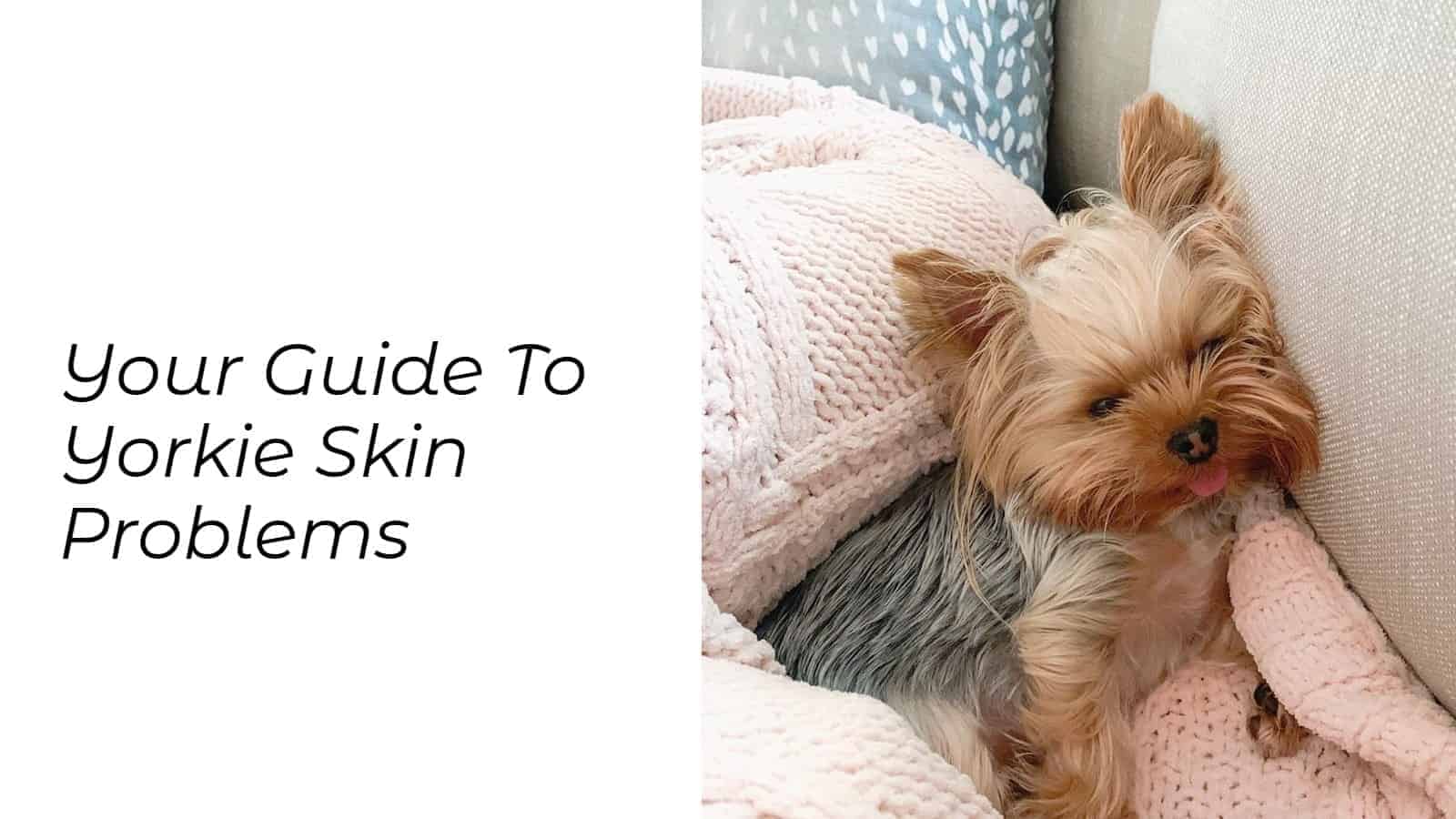Is your Yorkie itching skin to blood? It is very common for Yorkshire Terriers to experience skin problems at some point in their lives, mostly because of their delicate skin. This energetic, affectionate dog breed is one of the smallest breeds, so sometimes it can be hard to see if your friend has skin irritations and other problems.
Yorkies Coat
Before you start worrying about your puppy having skin problems, it is very important to learn about their type of coat first. Naturally, their coat is long, distinctive, and straight. It may look beautiful and stunning, but their coat is not the best defensive mechanism for wet and cold weather conditions. Because of that, it is crucial for them to wear a jacket when going outside. Their hair can grow pretty fast, so it is important to keep hair out of their eyes and face by trimming it or tying in a topknot. Also, it can get very dirty so regular bathing can remove bacteria from their coat.
Skin Allergies
Long coat on Yorkies can reduce airflow to the skin, and a place for allergens, especially if the coat is not properly washed and cared for. To avoid allergens, owners often choose a shorter grooming style. They are known to develop allergies as they grow and age. Allergens like mold, pollen, dust, fleas, and detergents can irritate skin and cause skin reactions and problems. The inhalant allergens like dust can especially be the trigger to atopic dermatitis. Atopic dermatitis is an inflammatory skin condition that makes your Yorkie’s skin itchy and red. The number one cause of skin allergies in Yorkies is often the saliva of fleas. In addition, Yorkies can also have skin allergies caused by food. Fungal infections, hypothyroidism, and dilution alopecia are conditions that impact coat and skin health. They are also very common conditions from which Yorkies can suffer.
Places Where Allergies Can Show
Allergies and skin problems can basically occur anywhere on the Yorkies’ body. It is recommended to frequently examine their coat and skin, in order to see the difference and potentially spot allergies. Yorkies have a bad habit of scratching, biting, and irritating the initial site to a point of hair loss and also infection. Atopic dermatitis is a very common skin problem, and common sites where it can occur are around the eyes, ears, nose, paws, belly but also on the joints. Indicators of allergies are often rough patches, redness, bumps, cracks, or even swelling. The normal healthy skin color of a Yorkshire terrier is white with a little bit of pink. It is smooth to the touch. Allergies are often followed by symptoms such as eye and nasal congestion, but also upset stomach.
Cause Of Skin Allergies
Many allergens manifest as skin irritation. When it comes to Yorkies, they are susceptible to flea allergies. Because of their long coat, fleas can easily get into and cause problems so it is very hard to keep the coat flea-free. Fleas can easily go from other dogs to your dog. They can jump up to 6 feet, so it is very hard to keep your Yorkie away from other dogs. For adverse reactions, only one bite from flea is needed. Fleas are a very common cause of skin allergies, but as we mentioned earlier there are also other very common skin allergens such as dust or mold. Also, certain foods can also be the trigger of skin allergies and other irritations. It may vary from dog to dog, but some of the common dietary skin allergens include preservatives and food colorants. Some Yorkies can also react differently to high mineral water such as tap water.

Some Of the Treatment Options
If you want your Yorkie to be healthy, prevention is the best treatment option. No matter how much we care about their skin, allergies can occur no matter what. Regular brushing, more if the coat is long and full provides an opportunity for us to examine the skin and spot difference and potentially cure fleas in their early form. It is also crucial to visit a veterinarian once a while for oral and other treatments for better prevention of fleas and other allergens. For even better prevention, using grooming products, detergents, and other cleaning products will help in fighting allergens. Many Yorkies are allergic to tap water, so to be sure that your Yorkie is healthy, providing them with low mineral content water could benefit their health.
Is your Yorkie itching skin to blood and you don’t know what to do?
Identifying the allergen is also a great way to prevent Yorkies from fleas. Many common allergens often can be detected through blood and skin examination. If it occurs that your Yorkie is allergic to a certain food, the vet can recommend a diet that will help. If it turns out that your Yorkie is allergic to that food, a bland hypoallergenic diet can be an option and it can last 8 weeks minimum. It means that after 8 weeks, that food would be slowly introduced in his regular meals with constant examination for adverse reactions. Found allergen would be removed from the diet and your dog would no more have allergic reactions. Often, commercial dog foods have many preservatives and additives. To resolve that, the vet recommends a fresh food diet that has no additives and if during that process no adverse reactions do not occur, the problem can be resolved by switching to other dog foods or a completely new diet.
If for some reason, your dog still has skin allergies, no matter how many preventative measures we took, veterinarians can prescribe medication. To reduce itchiness and inflammation oftentimes meds like corticosteroids and antihistamines are prescribed. When irritation is widespread, topical sprays like cyclosporine are recommended for fast relief and best results. Natural ingredients such as aloe vera can also help when it comes to allergies. Aloe vera should be gently rubbed onto irritated skin and left there until it drys out. Sometimes if that irritated skin was infected, nothing but antibiotics will help. Another longer-term treatment, which is also recommended to help your dog adapt to the allergen that is causing all those irritations, is immunotherapy.

Some Helpful Ingredients To Fight Allergies
To maintain the coat and skin health of your dog, a nutritionally adequate diet is very important. For dogs, a very important part of their health plays vitamin E. Vitamin E deficiency can cause hair loss and skin infections. Also, many other nutrients have benefits on coat and skin health. Omega-3 plays a big part in protecting skin and coat, and also helps with inflammation caused by allergic reactions. Fish oil has a large content of omega-3, so it is recommended to combine fish oil with regular everyday meals. Probiotics can also have an impact on skin allergies. From ingredients that we mentioned which can play a big part in the everyday health of your dog, here are some other ingredients that can help when it comes to itchy and irritated skin.
Coconut oil contains antifungal, antibacterial substances that help when it comes to skin problems. When applied to the skin, coconut oil can moisturize and soothe irritated skin.
Essentials oils can also calm irritated skin. Oils such as basil, oregano, lavender, peppermint, calendula flower, are good options for irritated and rash skin. Many of them are antiviral, antibacterial, antifungal, and anti-inflammatory.
READ ALSO: Does the Yorkshire Terrier Breed Get Well With Other Yorkies?
Can Fresh Food Help And How
Fresh food can sometimes be a good alternative to commercial dog foods. They are often packed with additives, so fresh food can often help if your puppy is sensitive or allergic to anything that is included in dog food. By eating fresh, your dog is consuming quality food and no chemicals and other substances that keep dog food “fresh”. Fresh food can be a good alternative to commercial foods, and if your dog is being sensitive to them, fresh food can be consumed while blood and other tests are being examined. It is not very common that Yorkies are allergic to certain foods, but sometimes from all of those additives, common skin reactions can occur.



6 thoughts on “Your Guide To Yorkie Skin Problems”